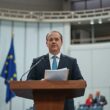A study by the German Institute for Economic Research (DIW) Berlin has found that appeals for energy conservation and other non-financial factors had a greater impact on reducing energy consumption in 2022 than the dramatic price hikes for heating. This conclusion is reported in the “taz” (Thursday edition).
“Short-term savings in energy consumption can be achieved more effectively through appeals and energy-saving tips than through price increases” said study co-author Till Köveker from the DIW Berlin’s Climate Policy Department to the “taz.”
Following the attack on Ukraine in 2022, gas supplies from Russia to Germany gradually came to a standstill. Energy prices soared enormously. Out of fear of gas shortages, politicians appealed to citizens to reduce their heating.
In fact, private households in Germany reduced their heating energy consumption by 16 percent in 2022 compared to the previous year. Only two percentage points of this reduction can be attributed to the rising prices, according to DIW researchers.
Non-monetary factors had more than four times the impact on consumer behavior in the crisis year than the higher costs, said Köveker. The remaining savings can be attributed to the milder weather and the return of employees to the office after the COVID-19 crisis. “Appels and energy-saving tips had at least a strong short-term effect” said Köveker.
The increased price, on the other hand, had only a weak impact. The study authors were unable to determine exactly which motives consumers had for reducing room temperatures.





